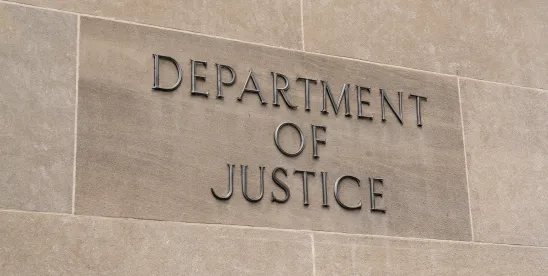After teasing the release of a new corporate whistleblower program in March 2024, Deputy Attorney General Lisa Monaco and Principal Deputy Assistant Attorney General Nicole M. Argentieri each took turns announcing on August 1 the details of the Department of Justice's (DOJ) Corporate Whistleblower Awards Pilot Program. Though the program started with a focus on generating Foreign Corrupt Practice Act (FCPA) cases, as we predicted in March, health care-related crimes involving commercial insurance fraud are included as an area of focus.
In total, DOJ announced four areas of focus for its new Corporate Whistleblower program:
- Foreign Corruption;
- Crimes Involving Financial Institutions;
- Domestic Corruption & Bribery; and
- Health Care Fraud Involving Private Insurers.
Foreign Corruption
DOJ's focus on foreign corruption is specifically targeted at potential FCPA violations that fall outside the jurisdiction of the Securities and Exchange Commission (SEC), which has its own highly successful whistleblower program that DOJ is now consciously imitating. Since the SEC has jurisdiction only over securities issued in the United States, DOJ hopes to use the new Corporate Whistleblower program to pursue foreign issuers and private companies (whether domestic or foreign) involved in alleged foreign corruption. For instance, DOJ previously targeted bribery of foreign officials by international trading companies involving securities not issued in the United States. Those efforts resulted in six corporate resolutions, convictions of twenty individuals, and over $1.7 billion in financial penalties, including forfeiture.
DOJ's message here is clear — it intends to step in where the SEC cannot by providing its own whistleblower program to initiate new cases to hold entities accountable for foreign corruption outside the jurisdiction of other federal agencies. Additionally, Principal Deputy Assistant Attorney General Argentieri made sure to highlight that DOJ will vigorously enforce the recently enacted Foreign Extortion Prevention Act, which allows DOJ to pursue the "demand" side of FCPA violations (i.e., foreign officials).
Crimes Involving Financial Institutions
With financial institutions, DOJ is focused on early detection and prosecution of the use of financial institutions to provide illicit financing for illegal operations — particularly focusing on defrauding or obstructing the efforts of financial regulators by numerous means. In highlighting its recent successes, DOJ indicated that it expects its most significant whistleblowers to come from the cryptocurrency industry as well as foreign financial institutions. Each of these corners of the financial industry has had recent failings in its anti-money laundering controls, and DOJ is clearly hoping that financial awards will inspire more employees to come forward. In particular, DOJ is adding these crimes to the program in an effort mainly to deter money laundering attempts through the use of the US financial system via fraud or misrepresentations.
Domestic Corruption & Bribery
DOJ is also hoping to utilize the program to curb domestic corruption — such as bribery of a government official by a company to obtain a government contract. Targeting this area has been an ongoing effort of DOJ for years (despite repeated losses at the Supreme Court), but this expands the whistleblower program in an effort to generate more of these cases.
Health Care Fraud – Private Insurers
Lastly, and most importantly, the final bucket targets health care fraud involving private insurers. Historically, DOJ has targeted fraud involving federal health care programs such as Medicare because DOJ's best tools for combatting alleged health care fraud (such as the Anti-Kickback Statute) only apply to federal health care fraud. DOJ has tried to expand that focus into private insurance in fits and starts in recent years by utilizing other statutes (including the Travel Act, Racketeer Influenced and Corrupt Organizations Act, and wire fraud), but this new Corporate Whistleblower Program indicates a determined directive to expand DOJ's prodigious anti-health care efforts into alleged fraud affecting private insurers. As noted by DOJ in its recent remarks, "there is no comparable whistleblower program for fraud involving private insurers, even though estimates show tens of billions of dollars in fraud each year." Opening the Corporate Whistleblower program to this type of conduct is intended to bring more cases in this realm by providing employees with the power to report criminal conduct, not just involving federal health care programs but also private insurers, to DOJ for a bounty. It is also likely intended to signal to prosecutors across DOJ that it is now open season on alleged health care fraud affecting private insurers.
Changes to DOJ's Self-Disclosure Policy
To further generate new cases and resolutions, DOJ also announced an amendment to its Corporate Enforcement and Voluntary Self-Disclosure Policy. Under that amendment, when a company receives an internal complaint from a whistleblower, if the company reports the conduct to DOJ within 120 days and before the DOJ initiates contact with the company, then the company, assuming it fully cooperates and remediates, is eligible for the biggest benefit under the program — a presumption of declination of criminal prosecution.
Conclusion
DOJ makes it clear with its pronouncement that investing in compliance programs now will reap benefits for companies in the future. Failure to do so may have severe consequences — particularly given DOJ's statements about its intention to aggressively utilize the program. The DOJ has more tools than ever to uncover criminal conduct in the corporate realm. Retaining internal investigation and corporate compliance attorneys is more important than ever for companies, as detection and remediation of illegal conduct early could make the difference between complete declination of prosecution, or serious criminal fines and convictions for individuals.





 />i
/>i

